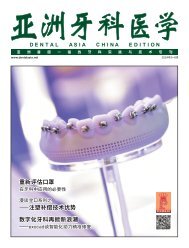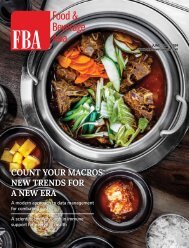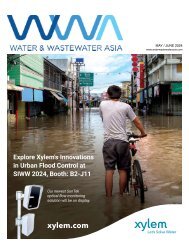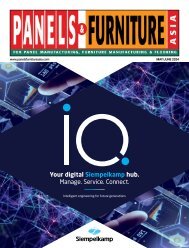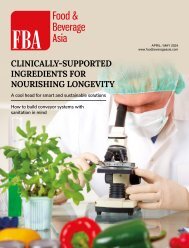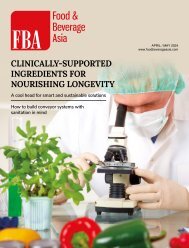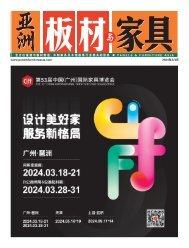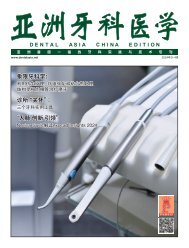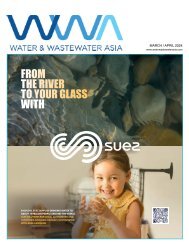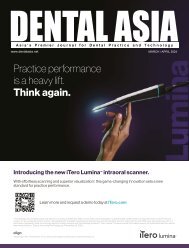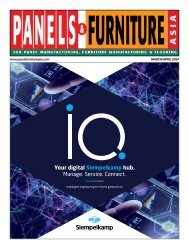Water & Wastewater Asia November/December 2020
Water & Wastewater Asia is an expert source of industry information, cementing its position as an indispensable tool for trade professionals in the water and wastewater industry. As the most reliable publication in the region, industry experts turn this premium journal for credible journalism and exclusive insight provided by fellow industry professionals. Water & Wastewater Asia incorporates the official newsletter of the Singapore Water Association (SWA).
Water & Wastewater Asia is an expert source of industry information, cementing its position as an indispensable tool for trade professionals in the water and wastewater industry. As the most reliable publication in the region, industry experts turn this premium journal for credible journalism and exclusive insight provided by fellow industry professionals. Water & Wastewater Asia incorporates the official newsletter of the Singapore Water Association (SWA).
You also want an ePaper? Increase the reach of your titles
YUMPU automatically turns print PDFs into web optimized ePapers that Google loves.
54 ON OUR RADAR<br />
Australasian deciduous crops such as apples and pears have a clean, green reputation internationally, which extends from growing through to production,<br />
and KDS sludge dewatering technology is being used internationally to handle food and beverage waste in an environmentally sensitive manner<br />
Sustainable food producer introduces NZ’s first KDS<br />
sludge dewatering technology to cost-efficiently reduce<br />
waste and environmental footprint<br />
A<br />
New Zealand food processing<br />
company committed to<br />
environmental excellence has<br />
become the country’s first adopter of a<br />
sludge dewatering technology engineered<br />
to cost-efficiently reduce the sustainability<br />
footprint of food, beverage, and wastewater<br />
treatment.<br />
The fruit producer is installing a compact<br />
and cost-efficient KDS multidisc Roller<br />
system from CST <strong>Wastewater</strong> Solutions<br />
to dewater wet sloppy screened waste<br />
from the peeling process. This transforms<br />
fruit waste from a wet and sticky heavy<br />
mass to a much drier product that is less<br />
messy, easier to handle, and transport for<br />
stockfeed or landfill.<br />
of $150 a ton to dispose of, including the<br />
specialised transport from the places where<br />
trade wastes are generated to centres where<br />
compacting, drying, recycling and disposal<br />
can take place in controlled environments,”<br />
said CST <strong>Wastewater</strong> Solutions Managing<br />
Director Mr Michael Bambridge.<br />
The NZ producer – which cannot be named<br />
because of contractual confidentiality<br />
provisions – is adopting its KDS technology<br />
to handle a highly variable quality and<br />
volume of up to 5m 3 /h.<br />
“This first NZ adopter of the KDS technology<br />
had previously tried alternative technologies,<br />
but none handled the variable volume<br />
involved or dewatered the fruit waste enough<br />
to prevent excess water and product from<br />
creating an unhygienic site and causing<br />
leakage,” said Mr Bambridge.<br />
The NZ producer selected a model SS611<br />
KDS with a longer press zone to achieve<br />
optimum dewatering of the sloppy and<br />
wet mix of peelings, leaves and pulpy<br />
fruit material.<br />
The technology will reduce volume by up<br />
to 90%, thus reducing transport costs and<br />
preventing any potential spillages during<br />
transport. There are also operational and<br />
OH&S benefits with the site being cleaner<br />
and easier to maintain, and the financial<br />
gain of not paying for transport and<br />
disposal of unnecessary water.<br />
“Heavy cakes of byproduct from growers<br />
and food processors can cost upwards<br />
KDS technology with its multi-roller system (above) eliminates sticky, sloppy sludge and spillages by<br />
producing a drier, much lighter and hygienic waste that is more easily transported and recycled) (See<br />
animation of the rollers here. See a video of the KDS used in fruit processing here.)<br />
<strong>November</strong> / <strong>December</strong> <strong>2020</strong> • waterwastewaterasia.com




